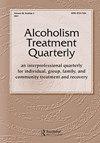Insights into a Recovery Community Center Model: Results from Qualitative Interviews with Staff and Member Facilitators from Recovery Cafe in Seattle, Washington
IF 0.9
Q4 SUBSTANCE ABUSE
引用次数: 0
Abstract
ABSTRACT Many people living with substance use disorder require multiple types of support to reduce use and mitigate harms. Recovery community centers have emerged alongside formal substance use treatment and mutual self-help groups as another option to support peoples’ recovery. Research on the helpfulness of recovery community centers is limited. The purpose of this paper was to describe what Staff and Member Facilitators perceived as helpful components of a recovery community center. Semi-structured interviews were conducted with 10 Staff and six Member Facilitators of a recovery community center, Recovery Café, in Seattle, Washington. Qualitative interviews were analyzed via grounded theory approach. Eleven themes emerged on the helpful components of Recovery Café, including tangible/infrastructure and intangible/experiential strengths. Three themes related to opportunities for program improvement. Many themes on the helpful components were consistent with prior research on recovery community centers and other supports for recovery. Findings provide insight into potential active ingredients and mechanisms of recovery community centers and highlight the potential role of recovery capital. Additional research is needed to test these components to improve the understanding of if and how recovery community centers work to support people with substance use disorders in recovery.康复社区中心模式的见解:对华盛顿州西雅图康复咖啡馆工作人员和会员辅导员的定性访谈结果
摘要许多物质使用障碍患者需要多种类型的支持来减少使用并减轻危害。康复社区中心与正式的药物使用治疗和互助团体一起出现,成为支持人们康复的另一种选择。关于康复社区中心的有益性的研究是有限的。本文的目的是描述工作人员和成员促进者认为康复社区中心的有益组成部分。对华盛顿州西雅图康复咖啡馆康复社区中心的10名工作人员和6名成员促进者进行了半结构化访谈。定性访谈采用扎根理论方法进行分析。恢复咖啡馆的有益组成部分出现了11个主题,包括有形/基础设施和无形/体验优势。三个主题与项目改进的机会有关。关于有益组成部分的许多主题与之前对康复社区中心和其他康复支持的研究一致。研究结果深入了解了康复社区中心的潜在活性成分和机制,并强调了康复资本的潜在作用。需要进行更多的研究来测试这些组成部分,以提高对康复社区中心是否以及如何支持药物使用障碍患者康复的理解。
本文章由计算机程序翻译,如有差异,请以英文原文为准。
求助全文
约1分钟内获得全文
求助全文
来源期刊

Alcoholism Treatment Quarterly
SUBSTANCE ABUSE-
CiteScore
1.60
自引率
11.10%
发文量
31
期刊介绍:
Alcoholism Treatment Quarterly is an exciting professional journal for clinicians working with persons who are alcoholic and their families. Designed to bridge the gap between research journals and information for the general public, it addresses the specific concerns of professional alcoholism counselors, social workers, psychologists, physicians, clergy, nurses, employee assistance professionals, and others who provide direct services to persons who are alcoholic. The journal features articles specifically related to the treatment of alcoholism, highlighting new and innovative approaches to care, describing clinical problems and solutions, and detailing practical, unique approaches to intervention and therapy.
 求助内容:
求助内容: 应助结果提醒方式:
应助结果提醒方式:


